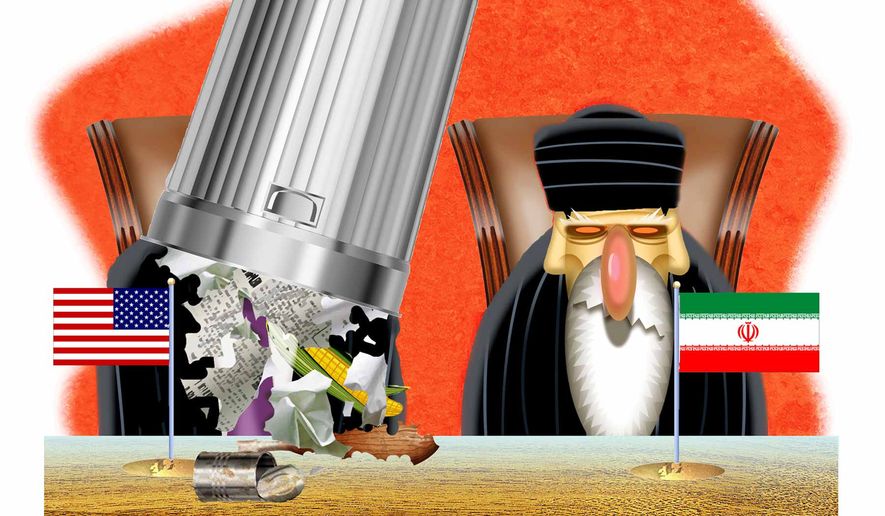OPINION:
Almost exactly a year ago, we wrote an essay about the diplomatic malaise that had consumed the Biden administration vis-a-vis Iran.
Team Biden seems driven by a continuous and unshakable belief that diplomacy is the appropriate tool for cabining Iran’s nuclear program. Like socialism, it simply hadn’t been properly implemented, but when done so, the results would be nothing short of miraculous.
However, as we approach nearly two years of negotiations with Tehran, what was once an exercise in desperation has become an exercise in embarrassment. Five months ago, national security adviser Jake Sullivan stated that the United States’ deadline for concluding an agreement in Vienna with Iran was mere “weeks” away.
Since then, the Biden administration has dispatched hordes of diplomats to Vienna, allowing them to be relegated to the anteroom as a result of Iran’s refusal to engage in direct negotiations with the United States. What great power in history has ever consented to such disrespectful treatment?
The International Atomic Energy Agency repeatedly reminds us that uranium enriched far beyond the limits allowed by the JCPOA is appearing in places Tehran promised it would not be, and Iran is being less than forthright with inspectors. Undeterred, the Biden administration behaves as if Tehran has abundant good faith at its core, just waiting to be uncovered by Rob Malley, President Biden’s lead negotiator. The Wall Street Journal editorial board refers to the seemingly endless, yet fruitless negotiations as “groundhog day,” but the compulsion is far more sinister.
The Biden administration’s myopic and irresponsible obsession with striking a deal with Iran is not only wasting limited American diplomatic resources but also reminding the Iranian regime that America is woefully unprepared to steer the Western world through emerging security crises. In Afghanistan, we exited carelessly and sloppily, but in Iran, we refuse to leave the table, still clinging to the prospect of some arrangement that might vaguely resemble the deal concluded by former President Barack Obama in 2015.
In the age of desperation, the Biden administration largely had the support of Congressional Democrats. In the age of embarrassment, the humiliation isn’t just an international enterprise but now a domestic one, as well. Just last week, a Senate that seemingly cannot agree on anything agreed by a wide margin (62-33) on a resolution stipulating that any future arrangement with Tehran should “address the full range of Iran’s destabilizing activities” in the Middle East, should not offer sanctions relief to the Islamic Revolutionary Guard Corps, and should not delist the IRGC from the State Department list of Foreign Terrorist Organizations.
The delisting of the IRGC as a foreign terrorist organization has remained a sore spot in the latest round of negotiations, as Iran threatens no deal unless such action is taken. The only Americans advocating for Iranian appeasement, however, are a group of progressive Democrats whose foreign policy views most would generally be characterized as misguided at best and anti-American at worst.
At some point, there should be a legitimate reflection as to the purpose of the embarrassing charade in which the Biden administration repeatedly shuffles to Vienna, only to be stiff-armed and disappointed by bad-faith actors. While political naivete likely accounted for a large amount of the past’s desperation, the current moment’s clinginess seems to stem from fear of conceding former President Donald Trump’s estimation of the Iranians to be correct — that there is no hope Tehran can be redeemed.
Politicians abandon campaign promises all the time. Democrats rarely admit Mr. Trump’s political instincts were correct.
However, with the latest demand by Iran to delist the IRGC — an act politically unpopular on both sides of the aisle — Mr. Biden has been given the political window to walk away. The absurdity of the request provides the Biden administration the political cover it needs to tell Tehran that the United States is no longer interested in granting the regime concessions in exchange for superficial limits on Iran’s nuclear program.
Tehran’s heel-digging alone should have been enough to prompt Team Biden to abandon Mr. Obama’s foreign policy legacy in the halls of Grand Hotel Wien. Maybe not. The good news is that the Biden administration has been given another opportunity to save face, both domestically and internationally.
If the Biden administration does manage to conclude a deal, it will be a watered-down version of the JCPOA, the result of years of haggling and concessions to the regime. If the deal is dissimilar enough to its predecessor, it will be forced to undergo congressional review, thanks to the Iran Nuclear Agreement Review Act. The substance of such review, which should lay bare the emptiness of the deal itself, will deal yet another embarrassing blow to the administration, as moderate Senate Democrats are forced to balance their own conscience against the political posturing of Mr. Malley and his cadre.
Such posturing made little sense last year. In the age of an emboldened Russia and an even more ambitious China — both eager to see the United States embarrass itself before Iran — it makes even less sense.
• David S. Jonas is a partner at FH+H Law Firm in Tysons, Virginia. He teaches Nuclear Nonproliferation Law & Policy at Georgetown University Law Center and the George Washington University Law School. Erielle Davidson is the associate director of the Center for the Middle East and International Law at George Mason University’s Antonin Scalia Law School.




Please read our comment policy before commenting.